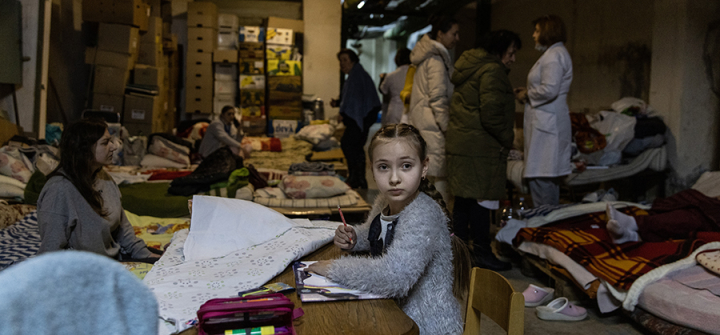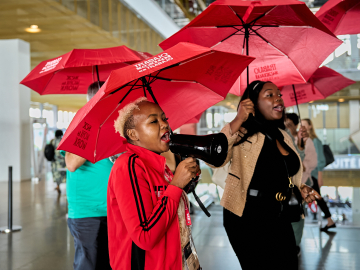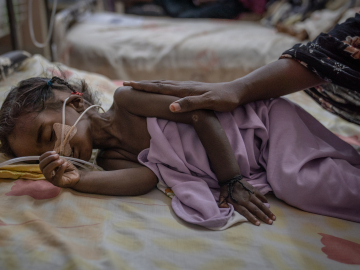Attacks on Health Care: Responding to the Brutal Reality
Russia’s attacks on health care facilities and health workers in Ukraine—with 100 attacks documented by the WHO as of last week—began soon after the February 24 invasion and continue relentlessly. Governments in Syria, Ethiopia, and other countries, too, have notoriously flouted international law protecting health care that reaches back 150 years.
How can health facilities, health workers, and the ill and injured be protected? What can be done to stop such attacks? International legal and health experts are meeting on Wednesday, April 13, noon to 1 p.m. EDT, in a hybrid event at the Johns Hopkins Bloomberg School of Public Health.
In the following Q&A, event speakers frame the issues from humanitarian, historical, and current perspectives and offer potential solutions. The experts are:
- Sergii Dvoriak, MD, PhD, DMedSci, head of the board, Ukrainian Institute for Public Health Policy
- Mulugeta Gebregziabher, PhD, vice chair, Department of Public Health Sciences, Medical University of South Carolina
- Chris Beyrer, MD, MPH, director of the Center for Public Health and Human Rights at the Bloomberg School
- Len Rubenstein, JD, director of the Program on Human Rights, Health and Conflict at the Center for Public Health and Human Rights at the Bloomberg School
What’s happening in Tigray?
MG: The ongoing war in Ethiopia, which began in November 2020, has caused a catastrophic health and humanitarian crisis. 75% of the 7 million people in Tigray face severe hunger. Almost a million of them face famine. More than 80% of hospitals and health facilities in Tigray have been looted and destroyed. Only 1,300 of the more than 20,000 health care workers prior to the war in Tigray are reporting to their duties.
What’s happening in Ukraine?
SD: Russian troops have moved from north of Ukraine and are now focusing on eastern part of Ukraine and also the south. Central Ukraine will be in better situation. Our professionals, the Minister of Health and the Public Health Center, people who work in hospitals in clinic—they’re doing a great job and trying to fix everything. And now we have humanitarian support and help from Red Cross and different international organizations.
Unfortunately, we cannot be sure what will happen tomorrow or in a week. We have absolutely no chances for some optimistic scenario. Mr. Putin and his troops will move forward to try and achieve his goals. It’s just destroying all of Ukraine.
What’s behind the attacks health care in Tigray?
MG: That is really a very difficult question. Official statements of the Ethiopian government and the Amhara regional and state governments, say to the effect that they have to return Tigray backwards 50 years. And the only way they can do that was by destroying civilian infrastructure. Unfortunately, health facilities were among that—as were schools, water infrastructure, agricultural industries, the pharmaceutical industry, universities. And humanitarian workers and health workers have become also victims of all that.
Is there anything that can be done to dissuade Russia?
SD: I don’t think so. I’m very pessimistic about it. There is only one organization which can stop Russia. It’s NATO. Because Russians can be stopped only by military response. The time for negotiations… [is] completely over. I cannot remember the words of Mr. Churchill in 1939, but he said, it’s impossible to negotiate with a tiger if your head is in his mouth.
Are Russia’s attacks on Ukraine a “new low”?
LR: Russia has a long history of attacking hospitals in war, most notably in its 1999–2000 war in Chechnya and in joining the Assad regime in bombing hospitals in Syria. But it is not alone. Attacking health care facilities and personnel in armed conflict has been a common feature of wars going back generations, and perpetrated by autocracies, democracies, and armed nonstate groups.
In the period 2016–2020, there were more than 4,000 attacks on health facilities and personnel in conflicts around the globe.
What are the impacts of attacks like these?
CB: Obviously, the first is just the very direct injuries and damage to providers, to patients, to everybody who’s in a facility. The second is that when hospitals and other health care facilities are targeted, people avoid them who need care. The third is that you drive health professionals away because they’re being targeted. So you have a brain drain that can be can really … have lasting impacts.
And the fourth, which I think now you see in countries with more lingering conflicts like Burma, is that you just degrade the overall health care infrastructure, and you just really go dramatically backwards in terms of health outcomes. That certainly is the case with Afghanistan.
In the long term, in Ukraine, there are whole cities that are going to have to be rebuilt. Mariupol is a ruin. The Russians have blown up cancer treatment centers, blood banks, maternity hospitals, pediatric hospitals, and all of that is going to have to be rebuilt.
What will it take to reverse this trend of attacks on health care?
LR: Prosecutions of perpetrators of these crimes is a critical step. But it is not the only one. The UN Security Council unanimously adopted a resolution in 2016 requiring governments to reform laws, revise military practice, investigate violations, and hold soldiers and their commanders to account, and to act collectively as an international community to investigate and prosecute where domestic justice systems fail to do their job. To date, governments have not carried out their responsibilities to implement the resolution. We need leadership at every level—among governments, international agencies and the public health and global health communities—to prevent attacks and hold those who breach the law to account.
What’s the history of prosecution for attacks on health care facilities?
CB: There’s only actually been one prosecution in the International Criminal Court. And that was in Bosnia where the Serbs raided a hospital and killed all the male patients because they were doing basically ethnic cleansing of Bosnian Muslims. And those people actually were tried and found guilty and sentenced to prison.
Dr. Gebregziabher, what’s your message to the global community about Tigray?
MG: The international community that has leverage. Governments need to push for more access for aid. Almost half a million people could die, if something is not done in the next couple of months because they have lost their cropping season, already two years in a row. Now, this third one is coming, it starts in May. If this also passes, without them planting any crops, then it could be even more catastrophic.
People like me who are professionals, ordinary citizens, we can tell our legislators to pass legislation. Governments in developing countries listen to what’s going on in the US.
And I think we should be pushing for war and armed conflict to be recognized as priority agendas in public health, and other fields because it is preventable like any public health issue.
Dr. Dvoriak, what’s your message to the global community about Ukraine?
SD: Ukraine is not the only hot spot in the world. It just may be more fresh and more shocking. I I hope that solidarity of our colleagues from Western countries, particularly from the US, will help us because it’s really very important now that Ukraine have very strong international support. There are no questions about the aggressor’s part in this story and who are the victims of this story. Very often, they can say, “Oh, it’s not so clear, and so forth.” Now it’s clear for everybody.
Ed. Note: Interviews have been edited for length and clarity.
Join the 50,000+ subscribers in 170+ countries who rely on Global Health NOW summaries and exclusive articles for the latest public health news. Sign up for our free weekday newsletter, and please share the link with friends and colleagues.
A Ukrainian girl draws in a bomb shelter at the Okhmadet Children's Hospital on March 1, 2022 in Kyiv. Chris McGrath/Getty Images





